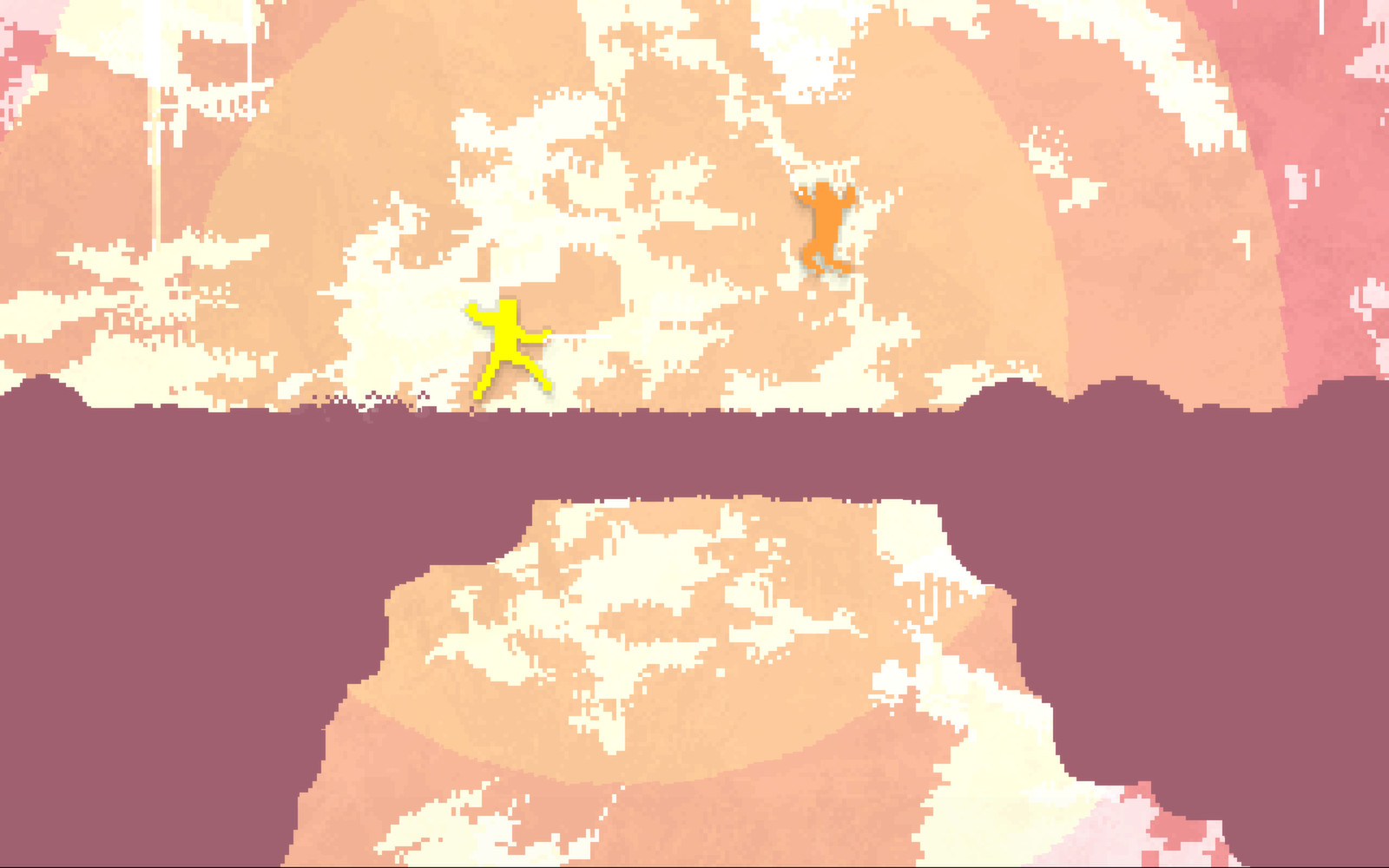Nidhogg - Review
Nidhogg embodies the aggressive, intoxicating thrill of competition. Through hazily defined personas and their ethereal exacting movements, a simple duel is transformed into a bustling frenzy of close saves, impossible luck, and overlapping cries of victory and defeat. It only took one match for me to fall in love with Nidhogg - to be hooked by the overwhelming energy that erupts both inside and outside the game - and hours later each round continues to bring with it that same feeling that I’m discovering something incredible for the first time and desperately need someone to share it with. In the most concise and direct of terms, Nidhogg is a two-player fencing game which calls back to the simpler times of 80’s arcade classics like Joust and Pong, but bridges the generational gap with a precision and adrenaline that would have melted the insides of the quarter devouring machines which have grown extinct over the last 30 years. Nidhogg’s indirect heritage doesn’t define it so much as provides a sense of place for Nidhogg where so many other games are quickly lost and forgotten. Already it feels like a classic I’ve loved for years and a staple game that is kept installed eternally as part of an evergreen collection of multiplayer games.
Nidhogg works so immensely well because it’s the sort of game you stop thinking about almost immediately. Controlling your swordsman in Nidhogg is impeccably intuitive as they move and react contextually and clearly, causing you to forget about how your controlling them as you focus all your attention on what you’re actually doing. Nidhogg feels much like a spontaneous dance between two people attempting to kill each other. It’s not about executing a particular move or performing a perfect counter block, but allowing yourself to be taken by the moment as you and your opponent flow together in a blur of kicks and stabs as you fight against each other in a deadly tug of war.

The organic interplay which develops over the course of a match helps keep Nidhogg from ever feeling one-sided the way many multiplayer games do. Everything which takes place during a match is the dual result of two players colliding and reacting with one another, which forms a dynamic that feels cordial and joyful. Even during my worst matches I often found myself erupting in laugher over my own mistakes and haphazard attempts to regain ground, because even when I’m losing Nidhogg’s ridiculous pace and explosions of pixels are still ludicrously fun to be a part of.
To me the lifespan of a multiplayer game is almost entirely based on whether or not it’s enjoyable to the person losing, and I’ve never played a competitive game where me and my supposed competitor have fallen into such fits of laughter precisely because we’re losing. Nidhogg is a brilliantly tactical and engaging beast of a fighting game, but that it can also allow for a much friendlier mood and feel satisfying even when you’re outmatched is a remarkable achievement very few other games can boast.
I suppose it has to be mentioned though that there is one rather enormous qualifier to recommending Nidhogg, that being the requirement of another local player. Though there is a single player mode it feels like a lifeless shell of its multiplayer counterpart, only potentially worth venturing into as a means of practicing advanced strategies against increasingly tough AI opponents. The online mode as well, despite being fairly functional, can’t compete with the feeling of having another person in the room with you (even more so if you are playing against random players). It will suffice if you have absolutely no other options, but I found myself growing tired of it fairly quickly and wishing the person I was playing with was sitting next to me instead of on the other end of the internet.
I desperately hope that whoever is reading this won’t be hamstrung by a lack of local competition though, as with another person in the room Nidhogg is a phenomenal experience that takes only moments to sell itself but has had me repeatedly stuck in place for hours at a time, always shocked when I finally look at the clock and realize how long we’ve been playing. It’s a finely tuned machine you won’t notice and a catalyst for the delightful multiplayer mayhem that few other games have come anywhere close to matching for me.
Final Word
Developer Messhof understands that multiplayer means more than putting two players on the screen; that making sure multiple people are having fun isn’t as simple as letting them play together, and that creating a friendly competition in a space where there can be only one winner is perhaps the easiest thing to screw up and the most imperative to get right. Nidhogg doesn’t assume what it’s doing is easy the way a lot of similar games seem to, but knows if it can get it right that the end result is an atmosphere and enthusiasm that can’t be matched. Wow, did they ever follow through on that one.


